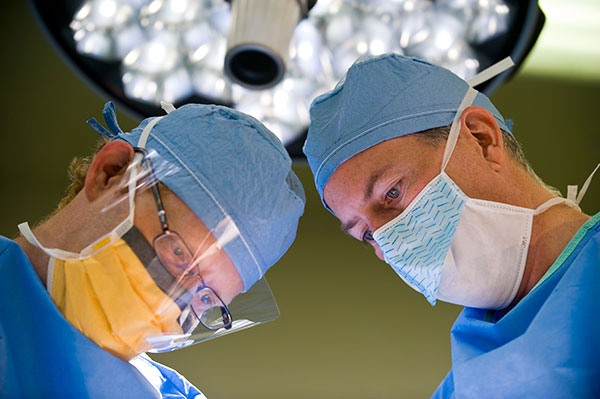Surgery is a primary treatment for many forms of cancer, but it can also be used to prevent, diagnose and stage the disease. In addition, surgery may be used in a palliative setting to relieve pain or other problems associated with cancer, or it may be used cosmetically to restore natural appearance following a curative procedure.
Surgeons at VCU Massey Comprehensive Cancer Center are board certified and subspecialize in treating specific types of cancer. They are also specially trained in advanced and unique surgical techniques, such as minimally invasive laparoscopy, microsurgery, robotic surgery, HIPEC (heated intraperitoneal chemotherapy) and oncoplasty. The Massey surgery team also received U.S. News & World Report's highest ranking for lung, colon and ovarian cancer surgery in 2022.
They are also leading innovations in surgery, such as:
- Implanting CivaSheet, an internal radiation device to treat early-stage pancreatic cancer
- Utilizing Magseed, a wireless tumor localization device for more accurate breast tumor location and removal
- Implementing neoadjuvant therapy, which involves pre-operative chemotherapy, hormone therapy or radiation therapy to shrink tumors before surgery
- Immunotherapy, which is type of cancer treatment that helps the immune system fight cancer
They are an integral part of our patient-centered, multidisciplinary approach to cancer care, in which they work in cohesive teams comprised of medical and radiation oncologists, pathologists, radiologists and other specialists to evaluate and diagnose each individual patient and coordinate and customize their course of treatment.
For many of our surgeries at Massey we follow Enhanced Recovery After Surgery (ERAS) protocols to care for patients before, during and after surgery. Through ERAS, our patients are actively involved in their own recovery process. Components of the program may include:
- Pain management – Each patient has a personalized pain management plan designed to limit the use of opioids (narcotics).
- Early mobility and feeding – We help our patients begin to move and eat as soon after surgery as possible.
- Fluid management – We provide our patients with only as much IV fluid as they need to prevent fluid overload and bloating after surgery.
Following ERAS helps our patients recover faster, leave the hospital sooner and have fewer complications following surgery.
Our surgeons are faculty members in various departments at the VCU School of Medicine. Visit the links below to learn more about the VCU Health departments and divisions providing surgical care at Massey:
- Department of Surgery
- Division of Cardiothoracic Surgery
- Division of Colon and Rectal Surgery
- Division of Bariatric and Gastrointestinal Surgery
- Division of Pediatric Surgery (in partnership with Children’s Hospital of Richmond at VCU)
- Division of Plastic and Reconstructive Surgery
- Division of Surgical Oncology
- Division of Urology
- Department of Neurosurgery
- Department of Obstetrics and Gynecology, Division of Gynecologic Oncology
- Department of Orthopaedic Surgery
- Department of Otolaryngology – Head and Neck Surgery
Types of cancer surgery

Having surgery is different for every patient — depending on the type of surgery, the type of cancer and the patient’s health. For some people, surgery is a major medical procedure with life-changing side effects. For others, surgery is quick and has few side effects.
Several types of surgery are helpful to people with cancer. Some surgeries are used in combination with other types of treatment. The following is a list of surgeries with a brief explanation of their goals:
Curative surgery removes the cancerous tumor or growth from the body. Surgeons use curative surgery when the cancerous tumor is localized to a specific area of the body. This type of treatment is often considered the primary treatment; however, other types of cancer treatments, such as radiation, may be used before or after the surgery.
Preventive surgery is used to remove tissue that does not contain cancerous cells, but may develop into a malignant tumor. For example, polyps in the colon may be considered precancerous tissue and preventative surgery may be performed to remove them. Another example would be for people with very high risk for certain cancers to undergo removal of an organ, such as breasts or ovaries, to prevent cancer from occurring in the future.
Diagnostic surgery helps to determine whether cells are cancerous. Diagnostic surgery is used to remove a tissue sample for testing and evaluation in a laboratory by a pathologist. The tissue samples help to confirm a diagnosis, identify the type of cancer or determine the stage of the cancer.
Staging surgery works to uncover the extent of cancer or the extent of the disease in the body. An example of a surgical staging procedures is laparoscopy, which involves the insertion of a viewing tube with a lens or camera through a small incision to examine the inside of the body and to remove tissue samples.
Debulking surgery removes a portion, though not all, of a cancerous tumor. It is used in certain situations when removing an entire tumor may cause damage to an organ or the body. Other types of cancer treatment, such as chemotherapy and radiation, may be used after debulking surgery is performed.
Palliative surgery is used to treat cancer at advanced stages. It does not work to cure cancer, but to relieve discomfort or to correct other problems cancer or cancer treatment may have created.
Supportive surgery is similar to palliative surgery because it does not work to cure cancer. Instead, it helps other cancer treatments work effectively. An example of supportive surgery is the insertion of a catheter to help with chemotherapy.
Restorative surgery is sometimes used as a follow-up to curative or other surgeries to change or restore a person’s appearance or the function of a body part. For example, women with breast cancer sometimes need breast reconstruction surgery to restore the physical shape of the affected breast(s). Curative surgery for oral cancer can cause a change in the shape and appearance of a person’s mouth. Restorative surgery may be performed to address these effects.
Risks of cancer surgery
Risk is a part of any surgery. Though science and medical technology have made surgery a safe and reliable treatment option, there is always the risk of potential problems and side effects. In many cases, however, the positive effects of surgery outweigh the risks. The more you know about surgery for cancer, the more informed your choices will be.
Potential problems can arise during or after surgery. These are some issues you should discuss with your cancer care team prior to surgery.
- Bleeding is common during any surgery and is usually controlled. It can happen internally within the body or externally if a blood vessel was not sealed off or if a wound opens. Surgeons work to limit bleeding and are very careful when operating near blood vessels. Your surgical team will also be aware of other factors that may increase bleeding and may conduct lab tests to check your blood’s ability to clot normally.
- Blood cots are a typical concern after surgery, especially in the legs if a patient stays in bed for a long time. Blood cots can become a serious problem if they break loose and travel through the bloodstream. Your doctors will talk to you about ways to reduce the chances of blood clots after surgery, such as getting out of bed and becoming mobile as soon as possible.
- Reactions to anesthesia or other medicines needed during surgery are rare but possible. It is important to communicate any drug allergies to your doctors. Your vital signs will be monitored closely during surgery to spot potential drug reactions.
- Problems with other organs, such as the lungs, heart or kidneys are rare but can happen following surgery, especially among people who have existing health conditions. This is why your care team needs to know your complete medical history and does tests to look for possible risks before surgery is done.
- Some level of pain is normal after surgery, but it should not be allowed to slow down your recovery. Your doctor will discuss a pain management strategy with you that may involve drugs or physical therapy.
- Infection at the site of the surgery is possible, and doctors take great care to reduce this risk by cleaning the site and keeping it sterile. You may be given antibiotics to reduce the risk of infection following surgery, or to treat an infection after surgery.
- Bodily functions such as bowel activity can be slow to recover following surgery. Becoming mobile as soon as possible helps reduce this risk.
Before your operation, you should also talk to your doctor about possible long-term side effects that may result from your surgery. Generally, the more complex the surgery, the greater the risk of side effects. For example, you may want to discuss any effects on fertility and request to speak with a fertility specialist if the surgery involves your reproductive organs. Some surgeries may limit mobility or alter typical bodily functions. Your care team can connect you with a wide range of specialists and other resources to help you resume your life following treatment.
Please visit VCU Health’s website to learn more about how to prepare for your surgery.



